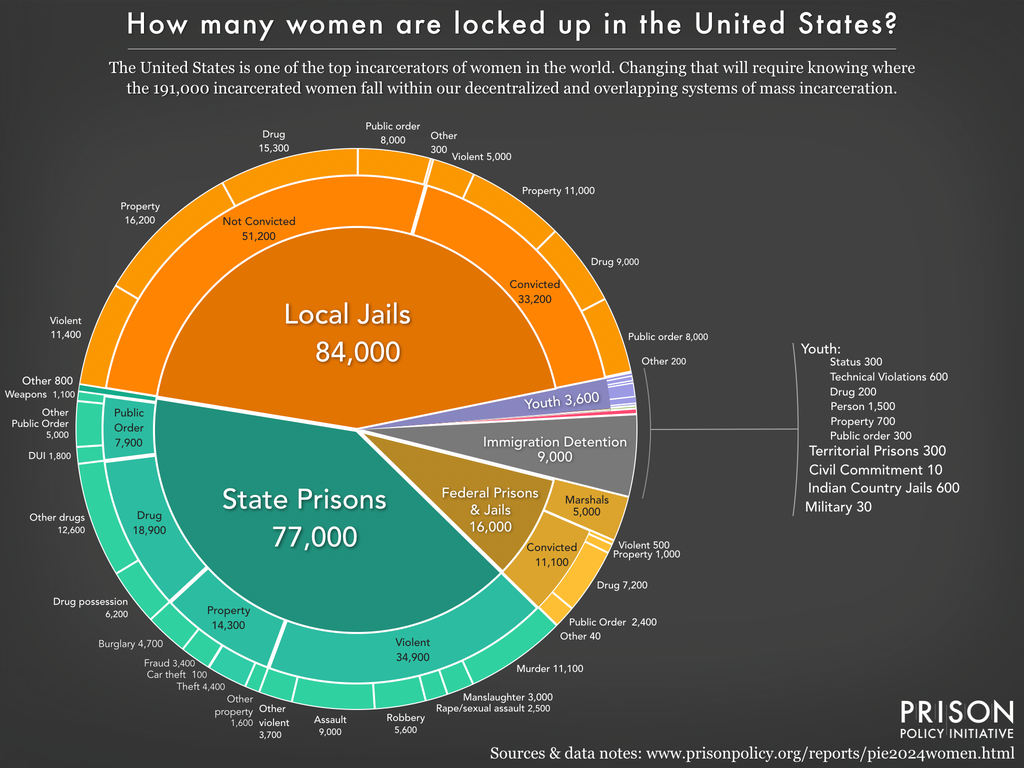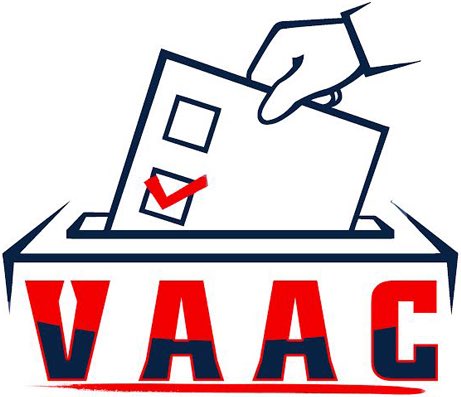This article was originally published by Prison Policy Initiative as “New report, Women’s Mass Incarceration: The Whole Pie 2024, shows the size and scope of women’s incarceration in America,” authored by Mike Wessler.
190,600 women and girls are locked up in the United States on any given day. That’s the top-line number from the new report Women’s Mass Incarceration: The Whole Pie 2024, released today by the Prison Policy Initiative. However, that number tells only part of the story of women’s incarceration in America. The report dives deep into the data to provide the most recent and comprehensive data on how many women are incarcerated in the U.S., in what kinds of facilities, and why; as well as detailed data on incarcerated women’s demographic makeup and health.
Women in the U.S. experience a dramatically different criminal legal system than men do, but data on their experiences is difficult to find and put into context. The new edition of Women’s Mass Incarceration: The Whole Pie, which the Prison Policy Initiative has published since 2017, fills this gap with richly-annotated data visualizations about women behind bars.
“Like in so many other aspects of life in America, the unique experiences of women in the criminal legal system are obscured by those of men, treated as an afterthought,” said Aleks Kajstura, co-author of the report. “While incarceration impacts all people, tearing them away from their families, damaging their health, and putting an additional financial strain on those already living on a razor’s edge, the criminal legal system is particularly harsh for women in unique and damaging ways.”

The report particularly examines the important role of jails in women’s incarceration. 93,000 women are held in jails, and the majority— 51,000 — have not been convicted of a crime. It explains that unaffordable cash bail and a criminal legal system that funnels them into jails after conviction are likely responsible for so many women being held in these facilities. The report goes on to show that jails can be especially deadly for women, with high rates of death from suicide and drug or alcohol intoxication. Additionally, the report highlights that, because they’re generally designed for shorter stays, jails are poorly positioned to provide healthcare for women, and that these facilities make it difficult for women to stay in touch with their families, by charging high rates for phone calls and restricting mail.
Women’s Mass Incarceration: The Whole Pie 2024 also includes a section offering insights about the backgrounds and experiences of women in state prisons. Key takeaways include:
- In the U.S., women are held in 446 state prisons, 27 federal prisons, 3,116 local jails, 1,323 juvenile correctional facilities, 80 Indian country jails, and 80 immigration detention facilities, as well as in military prisons, civil commitment centers, and prisons in the U.S. territories.
- 58% of women in state prisons are parents to minor children, and of those, most are single mothers who were living with their children prior to imprisonment — making it likely that incarceration uprooted their children and led to termination of parental rights, permanently breaking up their families.
- Nearly 7,000 young women and girls are caught up in the various systems of confinement. Almost half are held in facilities for the juvenile justice system, and almost as many are unaccompanied migrant children in Office of Refugee Resettlement facilities.
- Girls of color and those who identify as LBTQ+ are disproportionately confined by the juvenile justice system. Black girls account for 32% of all girls in juvenile facilities despite making up just 14% of girls under 18 nationwide. Similarly, 40% of girls in the juvenile justice system are lesbian, bisexual, or questioning and gender non-conforming.
- Probation and parole play a significant role in the women’s criminal legal system, with an additional 808,700 women under these forms of control. They are forced to live under a complex set of rules and restrictions that set them up to fail and threaten them with reincarceration.
The new report is available here: https://www.prisonpolicy.org/reports/pie2024women.html
This article was originally published by Prison Policy Initiative as “New report, Women’s Mass Incarceration: The Whole Pie 2024, shows the size and scope of women’s incarceration in America,” authored by Mike Wessler
